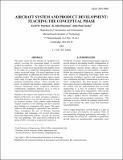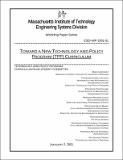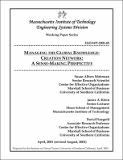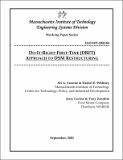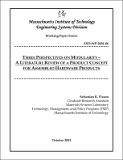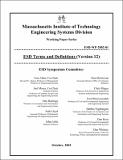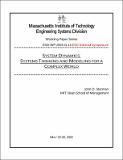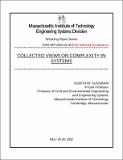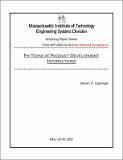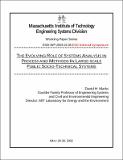Browsing Engineering Systems Division by Issue Date
Now showing items 1-20 of 273
-
Surviving and Thriving in the New World of Web Aggregators
(Massachusetts Institute of Technology. Engineering Systems Division, 2000-10)This paper examines the development of aggregators, entities that collect information from a wide range of sources, with or without prior arrangements, and add value through post-aggregation services. New Web-page extraction ... -
Aircraft System and Product Development: Teaching the Conceptual Phase
(Massachusetts Institute of Technology. Engineering Systems Division, 2001)This paper reports the first offering of a graduate level subject covering the conceptual phase of aircraft product development. The output of the conceptual phase is a system level specification that usually serves as the ... -
Toward a New Technology and Policy Program (TPP) Curriculum
(Massachusetts Institute of Technology. Engineering Systems Division, 2001-01)The mission of the MIT Technology and Policy Program (TPP) is: “Provide an integrative education to scientists and engineers who wish to lead in the development and implementation of responsible strategies and policies ... -
Initial Top-Level Characterization of the Air Force Sustainment System
(Massachusetts Institute of Technology. Engineering Systems Division, 2001-04)This draft white paper presents an initial top-level characterization of the Air Force sustainment system. The first part of the paper gives an overview of the proposed conceptual framework for system characterization. The ... -
Evaluating Accident Models Using Recent Aerospace Accidents, Part 1: Event-Based Models
(Massachusetts Institute of Technology. Engineering Systems Division, 2001-06)This report was inspired by a graduate reading group that was held at MIT during the fall semester, 2000. Each week, 20-25 graduate students and 3-4 faculty examined a different aerospace accident report (about evenly ... -
Extracting the Essence of Flexibility in System Design
(Massachusetts Institute of Technology. Engineering Systems Division, 2001-08)The modest purpose of this paper is to review the concept of flexibility as discussed in various fields of investigations, and to extract its characteristic features. In order to discuss any subject matter clearly, it is ... -
Managing the Global knowledge-creation Network: A Sense Making Perspective
(Massachusetts Institute of Technology. Engineering Systems Division, 2001-08)We have entered the era of the knowledge economy, a period when knowledge has replaced natural resources and capital as the most important economic resource. Increasingly, corporations are reaching out globally to secure ... -
Do-It-Right-Fisrt-Time (DRFT) Approach to DSF Restructuring
(Massachusetts Institute of Technology. Engineering Systems Division, 2001-09)In this paper, we argue, using two real-world applications from the automotive industry, that the biggest benefit of a Design Structure Matrix (DSM) model may come not from resequencing and partitioning, but rather from ... -
Designing a Requirement Driven Product Development Process
(Massachusetts Institute of Technology. Engineering Systems Division, 2001-09)This paper presents a technique to obtain a Design Structure Matrix (DSM) from a Design Matrix (DM). This technique enables us to obtain the design information flow pattern at early stage of the design, and apply the DSM ... -
Three Perspectives on Modularity – A Literature Review of a Product Concept for Assembled Hardware Products
(Massachusetts Institute of Technology. Engineering Systems Division, 2001-10)In recent years, modularity as a design strategy has received renewed interest. The term modularity, however, is often used to describe phenomena that are similar yet slightly different, for different products, and in ... -
ESD Terms and Definitions (Version 12)
(Massachusetts Institute of Technology. Engineering Systems Division, 2001-10)Basic terms related to engineering systems -
Improving the Software Upgrade Value Stream
(Massachusetts Institute of Technology. Engineering Systems Division, 2001-12)This paper reports findings from a two-year study to identify Lean practices for deriving software requirements from aerospace system level requirements, with a goal towards improving the software upgrade value stream. The ... -
ESD Internal Conference Extended Abstracts
(Massachusetts Institute of Technology. Engineering Systems Division, 2002-03)This working paper contains the extended abstracts received to date for the ESD Colloquium to be held on May 29 and 30, 2002. A proceeding of the complete papers are planned to be published in advance of the colloquium. -
System Dynamics: Systems Thinking and Modeling for a Complex World
(Massachusetts Institute of Technology. Engineering Systems Division, 2002-05)Todays problems often arise as unintended consequences of yesterdays solutions. Social systems often suffer from policy resistance, the tendency for well-intentioned interventions to be defeated by the response of the ... -
Collected Views on Complexity in Systems
(Massachusetts Institute of Technology. Engineering Systems Division, 2002-05)The term complexity is used in many different ways in the systems domain. The different uses of this term may depend upon the kind of system being characterized, or perhaps the disciplinary perspective being brought to ... -
Incorporating Uncertainty Into Conceptual Design of Space System Architectures
(Massachusetts Institute of Technology. Engineering Systems Division, 2002-05)The environment in which space systems are developed and operated can be classified as nothing less than dynamic. However, it is clear that the methods and tools relied on in conceptual design are based on static assumptions ... -
Patterns of Product Development Interactions
(Massachusetts Institute of Technology. Engineering Systems Division, 2002-05)Development of complex products and large systems is a highly interactive social process involving hundreds of people designing thousands of interrelated components and making millions of coupled decisions. Nevertheless, ... -
The Evolving Role of Systems Analysis in Process and Methods in Large-Scale Public Socio-Technical Systems
(Massachusetts Institute of Technology. Engineering Systems Division, 2002-05)The ESD definition of Large-Scale Socio-Technical Systems is large-scale and complex systems in which both human and non-human elements interact where the social and/or management dimensions tend to dominate. The word ... -
The Concept of a CLIOS Analysis Illustrated by the Mexico City Case
(Massachusetts Institute of Technology. Engineering Systems Division, 2002-05)The term CLIOS (Complex, Large-scale, Integrated, Open Systems) was conceived as way to capture the salient characteristics of a class of systems that are of growing interest to researchers, decisionmakers, policy makers ... -
Architecting/Designing Engineering Systems Using Real Options
(Massachusetts Institute of Technology. Engineering Systems Division, 2002-05)Everyone concerned with engineering systems faces a common issue: How do we design systems to perform well in a constantly evolving and thus risky context? As professionals concerned with the system (rather than its ...

